CSotD: Meanwhile, in other news …
Skip to comments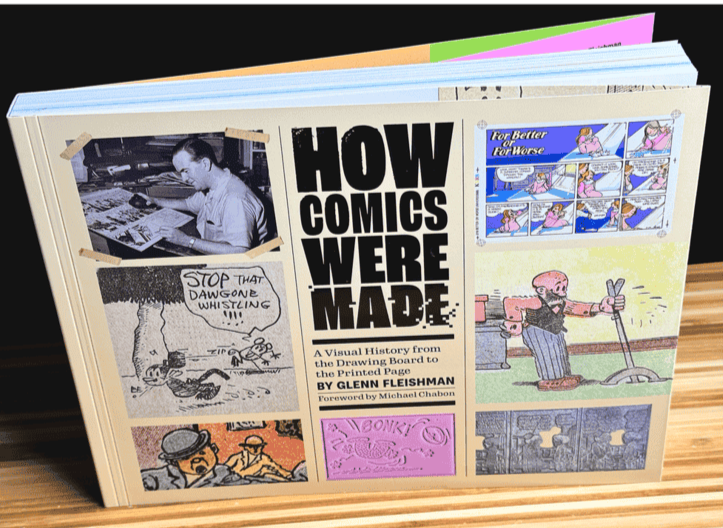
While we wait for Tuesday, how about a break to look at some other things happening in the world?
Glenn Fleishman has released How Comics Were Made, a Kickstarter-funded in-depth look at production through the years. It’s a beautiful book and, while it’s pricey at $73 in print, it’s also 280 pages deep and well laid-out with the aid of Mark Kaufman and edited by Harry McCracken, both of whom bring specific talents and experience to back up Fleishman’s own expertise on the subject.
And you can get an e-edition for $25, which is more affordable, though I’d hope you had a large enough screen to enjoy it in that format. I had a copy on my desktop and found it very readable, but I don’t think it would work nearly as well on a Kindle or, certainly, a phone.
Granted, I feel that way about all comics. YMMV.

Fleishman dedicates the tome to the Billy Ireland Museum, which I mention because I suspect he spent a serious amount of time there.
He faced the danger of possibly producing the kind of result that sparked the well-known kid’s review “This book told me more than I wanted to know about penguins.”
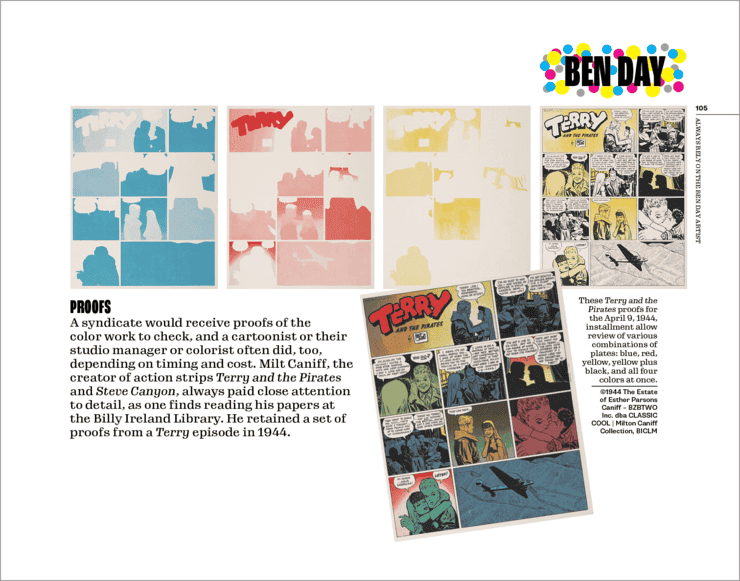
This book probably will tell you more than you wanted to know about the history and techniques of production, but it is lavishly illustrated throughout, which lightens things considerably, and whether you skim it or sit yourself down and truly ponder your way through, it’s a whole lot better to have more information than you needed than less.
Or, to put it another way, if the price doesn’t put you off, the depth of detail won’t either, and given the production values that have gone into it, it darned well ought to be authoritative.
My own background, if that helps understand my perspective, is that I came into newspaper production after the days of hot metal but made enough friends in the back shop that I heard a lot of stories and learned a lot about the days before waxing pages or, later, straight-to-plate printing.
I’m sorry to have missed the hot metal days, but I loved that big old camera that shot pages when I first started laying them out, and I’m glad I had a few years of creating projects in those days.
I also picked up a little knowledge from friend-of-the-blog Brian Fies, who shared his experiences in things like figuring out where color pages could land in Mom’s Cancer as well as his experiments in reproducing old-style comic pages in Whatever Happened to the World of Tomorrow.
Even with just that little half-absorbed background, I found “How Comics Were Made” more fascinating than intimidating, and came away having been entertained as well as educated.
Here’s a whole lot more about the book and its creative team, and here’s how to get a copy of the book or some interesting pieces of merch.
Slightly Connected Rant: There is a long tradition in newspapers of the folks in the newsroom having no freaking idea how the backshop works and vice-versa. Much of the hostility between the front of the building and the back comes from a lack of communication and curiosity over each other’s work.
This gulf can only widen as papers are printed in other buildings and other cities. I absolutely hated my last two papers because I couldn’t walk back and confer with production and then watch my work roll off the presses.
Understanding how it all works is important.
Which makes this book that much more important for writers and illustrators.
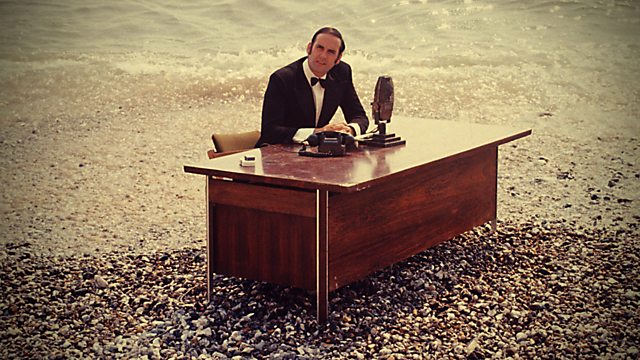
Juxtaposition of Something Completely Different
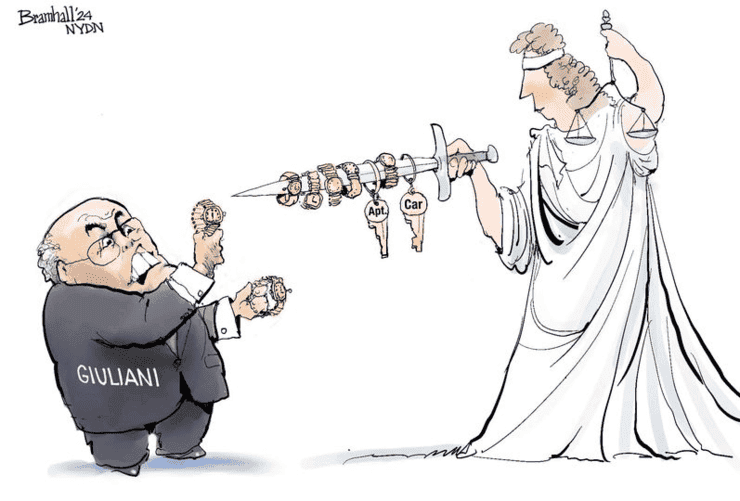
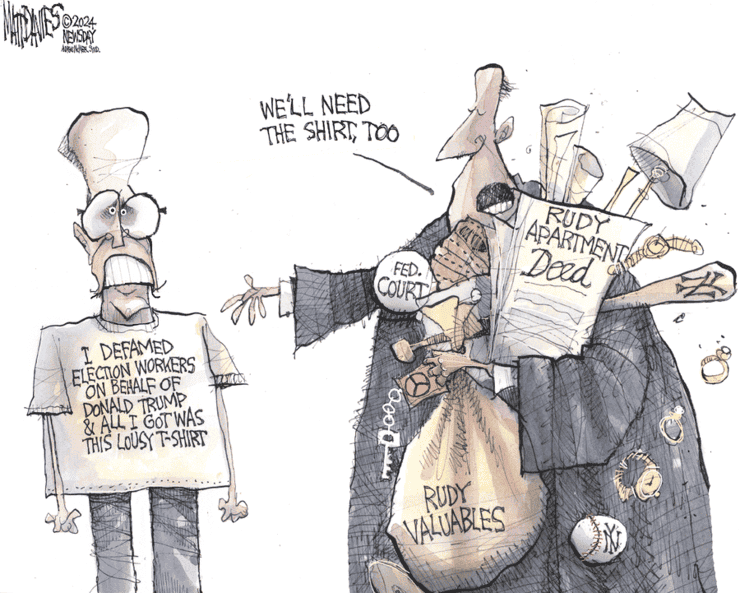
Rudy is stalling on turning over his stuff to the election workers he defamed, as shown by his fellow New Yorkers from, respectively, the New York Daily News and Newsday.
Given his tumble into eccentricity and Trumpitude, the schadenfreude in watching Rudy fall apart has been irresistible, but before the Four Seasons and Borat and now this, there was the “America’s Mayor” part of his career, which makes his current status tragic as well as buffoonish.
I lived in New York at the time of his fall, and I can well remember that, when he ran against Hillary Clinton for the Senate, the race was considered a toss-up: Even Democrats had some admiration for Giuliani and there was a fair amount of resentment over a carpetbagger from Arkansas running in New York.
And then he suddenly went to pieces: He announced a cancer diagnosis and his decision to drop out of the race and also his decision to get divorced, which he told reporters about before he informed his wife and family. And he thrilled gossips by revealing the name of his new Main Squeeze.
This didn’t all happen in one news conference, but it was just about that abrupt and certainly that bizarre. The GOP rushed an interchangeable nonentity into the suddenly empty slot and Hillary won 55/43, which isn’t a landslide but was hardly the squeaker predicted for the Clinton/Giuliani race.
If Rudy had quietly gone into retirement, that might have been the end of things, but his continuing penchant for popping up in odd places in odd company rubs salt into the wounds for NYers who had trusted and admired him.
It’s a bit like the ending of “The Man Who Would Be King.” Once they realize you’re not a god, their disappointment is heightened by a hearty dose of resentment.
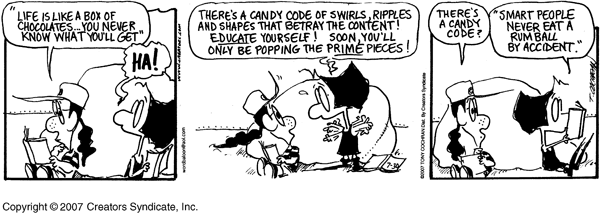
Then there’s the much ballyhooed reunion of Robert Zemeckis, Tom Hanks and Robin Wright for what sounded like a sequel to Forrest Gump but turned out to be a completely different movie they hope Forrest Gump fans will want to see.
I suppose they will, but I thought Forrest Gump was a load of glurge, beginning with, as Agnes (Creators) pointed out, the fact that you sure as hell can tell what is in a box of chocolates, since even if you don’t learn the swirls and shapes, there’s often a map inside the box lid.
But beyond the Inspiration Porn — a cinematic relative of the Magical Negro — I feared the societal impact of technical trickery and said so at some length in a column I’ll stick by 30 years later.
Truth and illusion: We don’t know the difference.


Comments 9
Comments are closed.